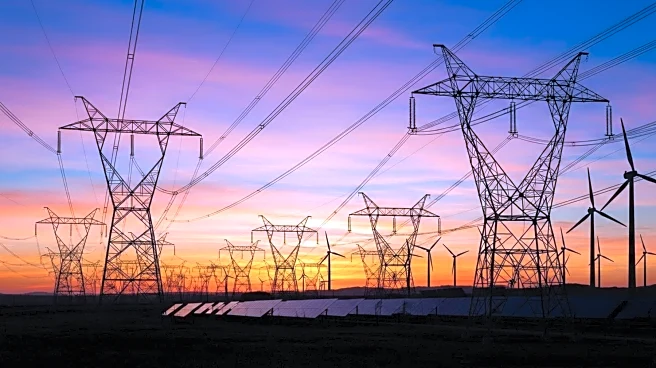What is the story about?
What's Happening?
Renewable energy sources, particularly solar and wind, are increasingly dominating the U.S. power generation landscape. In the first seven months of 2025, solar energy accounted for over 16 GW of the 21.5 GW added to the U.S. power system, with wind contributing nearly 3.3 GW. Despite concerns about the reliability of renewables due to their intermittent nature, grid operators and analysts emphasize their importance in the evolving power system. Automated energy markets are selecting renewables over other resources due to their cost-effectiveness, even as demand for electricity rises.
Why It's Important?
The shift towards renewables in the U.S. energy market has significant implications for energy policy, economic competitiveness, and environmental sustainability. Renewables offer a cost-effective solution to meet rising electricity demand, driven by factors such as data center growth and electrification. This transition supports efforts to reduce carbon emissions and combat climate change. However, it also presents challenges in ensuring grid reliability and managing the intermittent nature of renewable energy sources. The ongoing development of renewables reflects broader trends in energy diversification and technological innovation.
What's Next?
As demand for electricity continues to grow, the U.S. energy market is likely to see further investments in renewable energy infrastructure and storage solutions. Grid operators may explore new strategies to enhance reliability and integrate renewables more effectively. Policymakers could consider additional incentives to support renewable energy development, while addressing concerns about grid stability. The evolving energy landscape may also prompt discussions on regulatory frameworks and market mechanisms to facilitate the transition to a more sustainable energy system.
Beyond the Headlines
The increasing reliance on renewables highlights the need for a comprehensive approach to energy planning that considers economic, environmental, and social factors. The transition to a renewable-dominated energy system may influence cultural attitudes towards energy consumption and sustainability. It also raises ethical questions about the balance between economic growth and environmental protection. As renewables become more prevalent, the U.S. may play a leading role in shaping global energy policies and promoting sustainable development.















